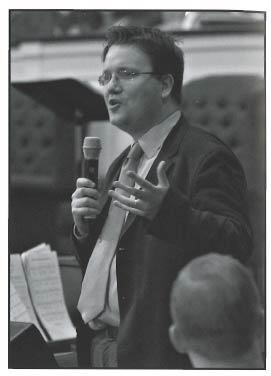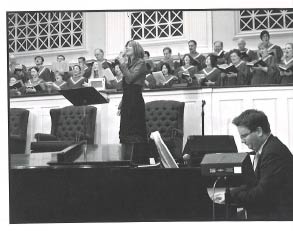Updated May, 2025
Keith Getty has played an important role in developing modern hymns for the church. With Stuart Townend, he has written “In Christ Alone” (see RW 71, p. 33) and “The Power of the Cross” (RW 71, p. 28), both sung around the world today. These hymns aim to teach the truths of the Bible for multigenerational Christian worship.
Keith is married to singer-songwriter Kristyn Getty. They have collaborated on hymns, songs, musicals, and children’s music. They were in Grand Rapids a few months ago as part of their two-year tour of North America. Some of us at the Calvin Institute of Christian Worship met with them in anticipation of their coming to the next Worship Symposium at Calvin on January 25-27, 2007. We are glad to include this interview from May 2006, as well as an introduction to four of Keith’s songs (see “Songs for the Season,” p. 16).
—Emily R. Brink
RW: The word hymn sounds old-fashioned to many young people today. Why did you start writing hymns?
KG: I grew up in a family where singing hymns was greatly loved. In fact, much of what I understood about the Christian faith was engraved in my mind and heart by those lyrics. Around six years ago I was involved in many different sectors of the music industry and had not really applied my abilities to writing songs for the church. I was challenged by a pastor in Belfast to perhaps try and bring some of what the old hymns of the faith had brought to the church through the centuries to the contemporary church: songs that would have room to breathe out the faith, the great stories of the Bible, the challenges of the gospel in a way that might be sung by many age groups and generations.
Kristyn and I married in 2004. I had a music business composing and arranging music for many artists as well as being a record and show producer. Kristyn was a talented singer and songwriter, and a gifted worship leader. The more we thought, the more apparent it became to us that we should work together on a common calling. So we decided to make hymn writing our primary focus where we would write, perform, and develop a company and ministry that fulfilled these ideals.
How do you think a hymn-style song can speak to an instant, pop, one-liner, channel-flicking society?

Lyrics of these old songs sometimes use words or phrases that might not easily be understood today, so I thought it would be useful to attempt a contemporary-vernacular-meets-fresh-melody-hymn-song-blend for today’s church (sounds like something you’d buy in Starbucks!).
Also, people love stories. Why is it that today’s child can be seen flicking from MTV to Disney to Hallmark but can also be seen in a corner reading The Lion, the Witch and the Wardrobe or Harry Potter without being able to put it down? There was a big story progression with “In Christ Alone” and especially with “The Power of the Cross,” which goes through Christ’s walk from Gethsemane to Calvary. People will sing theology forever if the song takes them on a journey! I have heard people pray, evangelize, and speak in the language of worship songs, so what a wonderful opportunity it would be to have almost creed-like hymns swimming around people’s heads!
Not all our songs follow such an epic story line. Worship leaders also have need for songs that fit a particular part of a service, for example, songs that simply say “sorry,” or that prepare us for hearing the sermon, or that teach us how to pray. Out of this need we have written several songs with very functional roles in a church service.
What we sing is so important because, to a degree, we are what we sing. What we sing provides a vocabulary by which we understand and express our faith. This is why we spend long hours talking with pastors and theologians who give us advice, feedback, and fresh challenges in terms of what they think congregations should be singing.
The healthiest congregational environment flourishes when the worship leader/worship songwriter partners with pastors in feeding the congregation well through the songs they sing and the sermons they hear.
What about the melodies—how important are these? Why write in the more hymn-like melodic style?
We are aiming to write melodies that people of different ages and backgrounds can sing and will sing. It is a high ideal! But we have found that students, young professionals, and the elderly are singing these songs. Is it possible that we could pursue to some degree a musical and lyrical goal that could help unite people in song instead of dividing people in frustration? We are not alone in working towards this.
In our hymns we have tried to fuse influences from folk music and classical music, as well as contemporary songwriting and classic hymns. We have found that when the music is melodically driven songs are easily singable, and if they are in a more hymn-like structure, once you get the first stanza you have got the song! Also we are trying to write hymns that for the most part can translate into either rhythm section arrangements or settings for choir, organ, or orchestra.
We’ve heard some mention of an “Apostles’ Creed project.” What is that?

The Apostles’ Creed project is an attempt to write songs that relate to the different articles of the Apostles’ Creed. This project has been a consuming passion, because it takes us through all the basic beliefs of the Christian faith and has provided a way for us to organize our writing on the key aspects of the faith—songs that we had already written and songs that we felt we must write.
One song that fits into that project is “The Power of the Cross,” a meditation on the sufferings of Christ. In communion we are commanded to “remember his death until he comes.” In the New Testament, Paul and the apostles often preached and prayed in more detailed and visual ways about the cross, turning all of our senses to Christ’s sufferings and their significance.
Stuart Townend and I considered how the reality of Christ’s sufferings should penetrate our worship services and were challenged by the need to explain the overwhelming significance and implications these have for our lives.
This the power of the cross
Christ became sin for us,
took the blame, bore the wrath
we stand forgiven at the cross.
Our hope is that the hymn “The Power of the Cross” will be a resource to the church as a declaration of what we believe and a song that challenges us by affording us time to really consider Christ’s sufferings.
So we see worship music as a teaching tool as well as a worshiping tool. When we sing to God we join with people of God from around the world and from every generation singing to God, about God, and responding to what God has done.
Thank you for that large vision; we pray God will continue to use you to write songs that help young and old sing their faith together.
